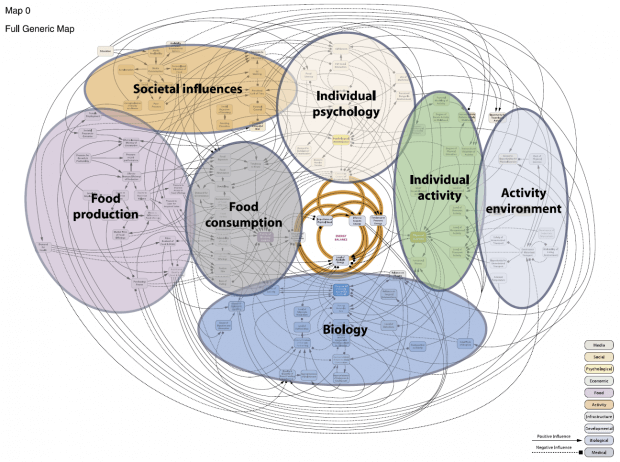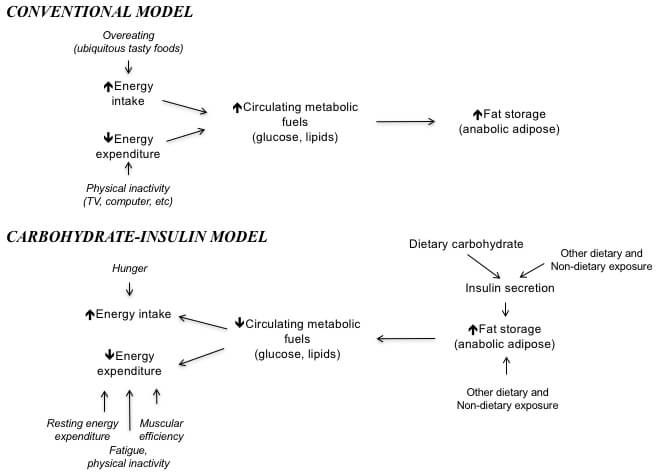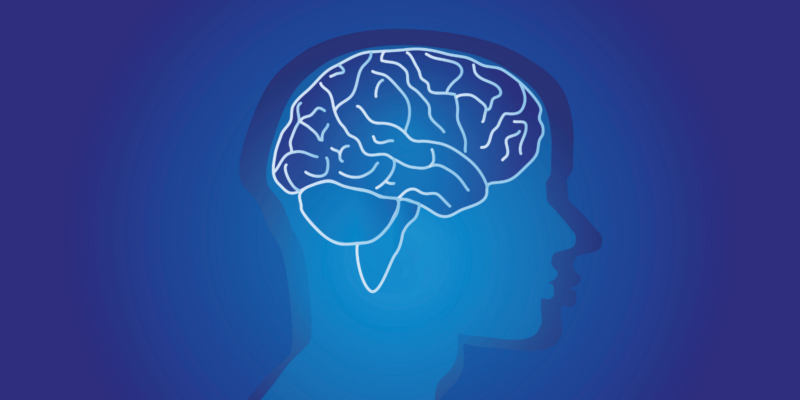Bodyweight set-point, Leptin, Insulin Resistance, Energy Balance.
(This article was posted on the mdsprogram.com website earlier)
Weight gain or more accurately, fat gain is a complex problem of hormones and the nervous (neuroendocrine) system. Most of you have lost weight in the past. However, did you regain all the weight? Some of you have probably reached a plateau in your fat loss. Why is that so? We don’t have all the answers yet, but here is my effort at (hopefully) simplifying the science
“Make everything as simple as possible but not simpler.” (Albert Einstein).
Why do I gain weight?
Complexity Of The Problem
As you can see in the graphic below, there are several factors that influence your body weight.

My goal in sharing the image above is to highlight the complexity of the problem. Something as complex as that definitely cannot be solved with solutions like “eat less and exercise more” or ” all you need is willpower” or “eat 3 meals and 3 snacks a day”.
Three Models to Explain Weight Gain
- Calorie-In-Calorie-Out (CICO) Model
- Carbohydrate-Insulin Model (CIM)
- Energy Balance
1) Calorie-In-Calorie-Out (CICO) Model:
You gain weight because you eat more calories than your body can utilize. Therefore if you can figure out how to eat less and move more, you will lose weight. It is only a problem of having too little willpower! How well does that work?
If you have used this plan of Eat-Less-Move-More, you know that it doesn’t work in the long term! This model assumes that fat loss is a problem of personal shortcomings.
Years of research have shown that over the long term, your body weight is controlled by biochemistry, rather than mere willpower. On a low-calorie diet, the body fights back……The Revenge of The Deprived Calorie by making you hungry and reducing your body’s Resting Energy Expenditure (more on this later).
If calories were all that mattered, then it means eating 100 calories of chicken is the same as eating 100 calories of biscuits (cookies). You know that is not true! The two are very different in terms of the metabolic response in your body.
The CICO model has been abandoned by most obesity researchers. In fact, obesity researcher, Dr. Zoe Harcombe, calls this the “psycho diet”.Unfortunately, it still has a large following amongst people who are probably not as familiar with the science (Including doctors! I was one of them until I learnt more!).
Now, wait a minute, you are probably thinking….”But I have lost weight by counting calories and eating less and moving more, so why is she saying it doesn’t work?”
Over a short period of time, a low-calorie diet may work, but we are talking about long-term fat loss.
The Biggest Loser Study:
The Biggest Loser is a reality TV show which included contestants who struggled with extreme obesity (BMI >40). Over a period of 30 weeks, the contestant who lost the maximum amount of weight was considered the winner. They had followed the eat-less-move-more method. They lost a lot of weight over a short span of time, but over the long term, it wasn’t that great.
A follow-up study ((Ref)) done after 6 years on 14 of the contestants showed that not only had they regained the weight, their metabolism had slowed down drastically.
2) Carbohydrate-Insulin Model (CIM) :
This model is based on the actions of the hormone insulin that is produced by your pancreas. According to the Carbohydrate-Insulin Model (CIM) of obesity, eating more processed, high carbohydrate and sugary food produces hormonal changes that promote fat deposition, increase hunger and reduce your metabolic rate. ((Ref))
You can see in the image below a comparison between the conventional model and the carbohydrate-insulin model of obesity.

You are probably familiar with the drug insulin, which is used as a prescription medication for the treatment of diabetes (Types 1 and 2). But here I am talking about the hormone insulin produced by your pancreas.
Insulin resistance is a condition where your cells become resistant to the actions of the hormone insulin. As Endocrinologist Dr. David Ludwig says, “Insulin is your fat fertilizer hormone.”
When you have insulin resistance you gain excess unhealthy fat in parts of your body like the abdomen (belly fat). Your body cannot manage your blood sugar levels well and over a period of time, you will likely develop type 2 diabetes.
Carbohydrates that you eat spike your insulin levels. Therefore, to lose weight you need to eat fewer carbohydrates than your body can tolerate. This carbohydrate tolerance level is different for each one of you. For some of you this carbohydrate tolerance level may be as low as 20-30 grams! As a reference, one apple is 20 grams of carbohydrate!
Personalized Blood Glucose Response (Video)
How will you know if you are Insulin Resistant?
Please check this infographic.
3) Energy Balance (or Energy Homeostasis)
At the centre of Figure 1 above is “Energy Balance”(I know you can’t read it clearly!). As you can see, all the different factors like food, activity, psychology etc. affect this important area.
Energy balance or homeostasis includes different biological processes that help your body maintain a specific weight. This is the bodyweight set-point.
What is the bodyweight set-point?
When you gain or lose weight, your body has the unique ability to go back to your previous weight. There are several mechanisms involving hormones, energy intake, energy expenditure and brain changes that will bring your weight back to where it was.
This bodyweight set-point applies to people who are overweight as well as to those of normal weight! You may have noticed that some of your friends have remained almost the same weight for many years. They don’t seem to gain weight even when they eat about as much as you do! (However, they may not necessarily be healthy. Bodyweight is ONLY one measure of health).
Overfeeding studies ((Ref)) done in people with obesity and lean people have shown that it is equally difficult for both to remain at a higher weight. Essentially your body defends a certain fat level, whether you are at a normal weight or have excess fat.
This is achieved by matching energy intake to energy expenditure over time. This is not as simple as it sounds. Energy balance is not merely eating food and spending food energy by exercising.
Rather than being a problem of simple passive accumulation of fat, obesity is a problem of disordered energy balance.
Leptin and Energy Balance: Should you test your leptin levels?
A few years ago one of my patients told me, “Doctor, you probably haven’t heard of this hormone called leptin.”
My know-it-all self wanted to tell her a lot of things 🙂 but fortunately, wiser counsel prevailed and I responded, “We still have a long way to go with leptin, therefore please don’t waste your money getting your blood leptin levels tested.” Why did I say that?
Leptin is a hormone produced from your fat tissue (White Adipose Tissue). The name comes from the Greek word “leptos”, meaning thin. Does it mean that leptin makes you thin? The answer is more complex than that!
The discovery of Leptin in 1994 was a landmark in the history of endocrinology (the study of hormones). The initial enthusiasm about using leptin for the treatment of obesity did not pan out as expected. It was thought that Leptin signals the level of energy stores to the brain. Therefore, as energy stores increase in fat, leptin levels rise, thereby telling the control centres in the brain to limit obesity by reducing food intake and increasing energy expenditure.
However, the amount of circulating leptin required to affect the central nervous system differs amongst individuals. This is dependent on genes, development and diet. Some people may simply require more leptin than others.
However, studies have shown that the more body fat you have, the higher your levels of leptin. Enter the term leptin resistance.
Leptin Resistance: Does it exist?
Just as insulin resistance causes fat gain, is there leptin resistance too? The term “leptin resistance” is often used to describe states of obesity in which high leptin levels and/or decreased responsiveness to leptin is observed. This led the National Institutes of Health to hold a workshop, “Toward a Clinical Definition of Leptin Resistance”. However, as this paper ((Ref)) in the journal Cell Metabolism concludes
“……no universal, quantifiable, and clinically useful definition of the term “leptin resistance” is feasible”. It is clear that the availability of relevant human data is limited, however, and a substantial amount of new information must be acquired and disseminated to accomplish these goals.”
What is known about leptin’s actions is listed below:
- Leptin and insulin resistance are intimately related. Therefore, if you can manage your insulin resistance well, leptin will work better too.
- Cortisol has an important relationship with leptin. ((Ref))
- Leptin levels are related to the amount of fat in your body. Therefore the more the body fat, the higher the levels of leptin.
- Fasting reduces leptin levels by 50% on the first day, even before fat loss kicks in ((Ref))
- Leptin levels are impacted by estrogens in women and male hormones (androgens) in men.
- Leptin and fuel switch: Leptin helps in maintaining blood glucose levels during fasting. When you stop eating or when you eat very little carbohydrates, your body switches from using carbohydrates from food as fuel to using your body fat stores as fuel. Therefore, when you fast your blood sugar doesn’t go down to dangerous levels. (Caveats for those of you on anti-diabetic medications). ((Ref))
- Leptin is linked to autoimmunity. ((Ref))
- Leptin affects reproductive functions, bone metabolism, and lipid and liver fat metabolism.
- Using leptin as a drug helps ONLY in very rare conditions. In those with genetic defects of the leptin gene, it works dramatically. And in those people who have lipodystrophy, a condition where there is too little fat on the outside and severe insulin resistance and excessive organ fat. But that doesn’t apply to most of you.
Bottom Line:
- Obesity is a complex problem and therefore simplistic solutions like “eat-less and move-more “do not work over the long term.
- Most of you with weight loss challenges are insulin resistant. If you are insulin resistant, a low carbohydrate diet and time-restricted eating will probably work better for weight loss.
- If you are not insulin resistant (a very small percentage), then there are other areas that have to be looked into.


